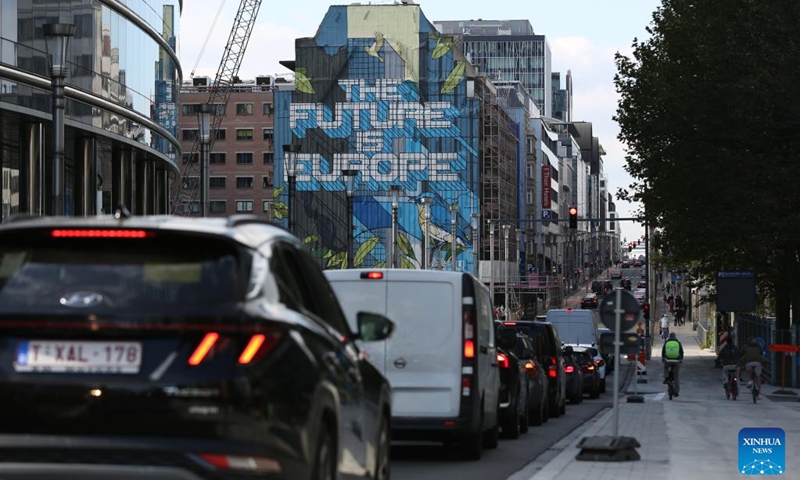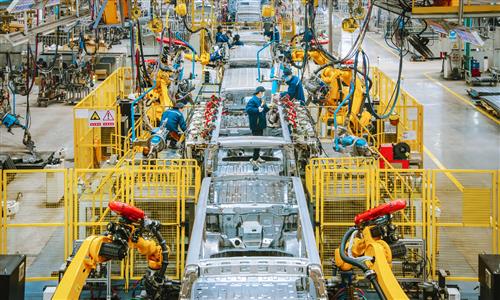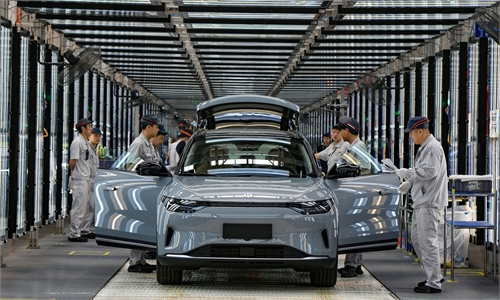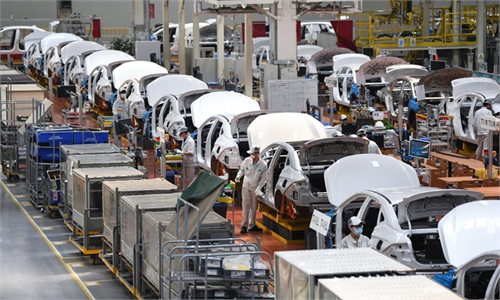Plan ‘may stifle’ tech innovation in EU
Enterprises in bloc warn of backlash against tariffs on Chinese EVs

Vehicles wait for traffic light near EU headquarters in Brussels, Belgium, Oct. 4, 2024. The European Commission announced Friday that it passed a vote to impose punitive tariffs on Chinese battery electric vehicles (EVs), sparking criticism from several European countries and auto industries who warn the move could boomerang against the European Union's (EU) competitiveness. (Xinhua/Zhao Dingzhe)
The EU's planned tariff hike on Chinese electric vehicles (EVs) faced a widespread backlash over the weekend. Chinese experts said on Monday that this move won't halt the robust growth of the Chinese EV industry on the global stage, but it could ultimately stifle technological innovations in Europe.
"The European Commission's proposal to impose definitive countervailing duties on imports of battery electric vehicles (BEVs) from China has obtained the necessary support from EU Member States for the adoption of tariffs," the EU said in a statement on Friday.
Major European automakers, including Volkswagen, BMW and Mercedes-Benz, have said that imposing tariffs on Chinese EVs is a mistaken approach and sends a fatal signal to the European automotive industry. Volkswagen CEO Oliver Blume has suggested credit for investments instead of punitive tariffs.
"Instead of punitive tariffs, this should be about mutually giving credit for investments," Blume recently said in an interview with German media outlet Bild am Sonntag.
The China Chamber of Commerce to the EU on Friday expressed deep disappointment and strong dissatisfaction with the EU's adoption of protectionist trade measures.
The chamber strongly suggests the EU to approach the final measures with caution, delay the implementation of tariffs, and prioritize resolving disputes and trade tensions through consultations and dialogue, according to an announcement sent to the Global Times.
Chinese experts said that the EU's move is a typical case of trade protectionism that uses political tools to meddle in economic activities, which in the long term will hinder the bloc's industrial growth and stifle its technological innovations.
The bloc's move contradicts the principles of global market dynamics and disrupts the economic order. Such measures not only hurt both sides - China and Europe - but also threaten the stability of global supply chains, Jian Junbo, a deputy director of the Center for China-Europe Relations at Fudan University's Institute of International Studies, told the Global Times on Monday.
China's EV industry has gained a significant advantage globally, and if Europe resorts to raising tariffs to isolate itself from this competitive technology, it risks missing a critical opportunity for growth, Jian said.
China's EV industry adheres to market principles and emphasizes robust competition, a spokesperson for China's Commerce Ministry said on Friday.
The EU's protectionist actions seriously violate World Trade Organization rules and disrupt normal international trade. Such measures not only obstruct trade and investment cooperation between China and Europe but also delay the EU's green transition and affect global efforts to combat climate change, the spokesperson noted.



